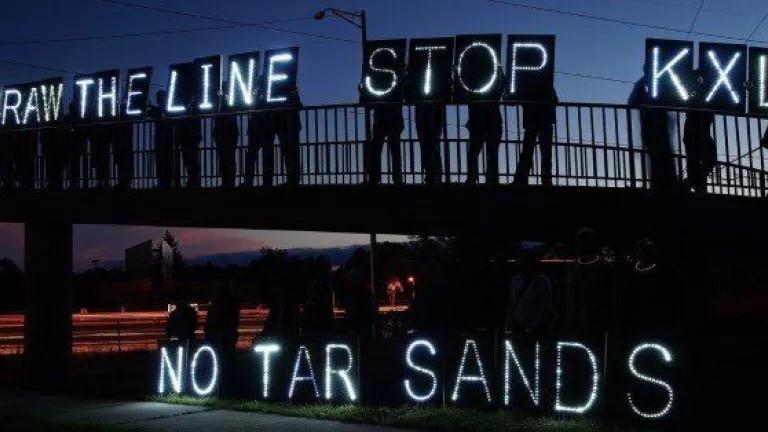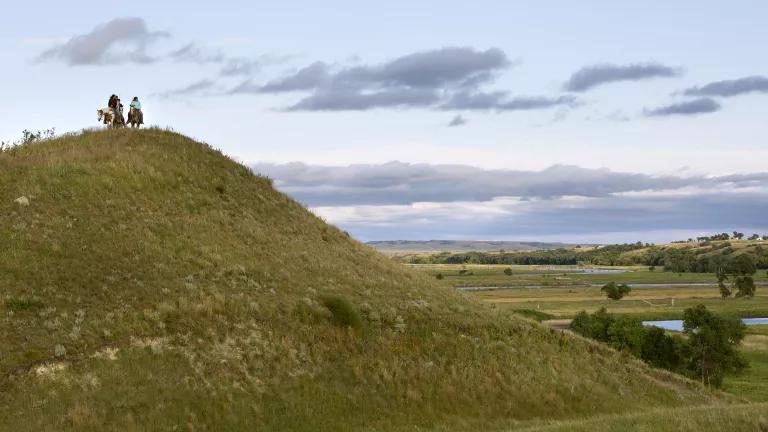Nebraska Ruling Does Not Clear Path for Keystone XL
While Nebraska’s Supreme Court removes one obstacle to Keystone XL, many remain.

While Nebraska Supreme Court’s recent ruling ends a challenge to Keystone XL’s proposed route through the state, TransCanada’s (TC Energy’s) tar sands pipeline proposal still faces many significant obstacles. Last week’s ruling deprives Nebraska’s landowners and members of the Ponca and Yankton Sioux tribes along Keystone XL’s route the opportunity to engage in a public process established by the state’s pipeline siting law to have their concerns addressed. However, it does not clear the way for the embattled tar sands pipeline. The proposed Keystone XL tar sands pipeline still faces three federal lawsuits, the need to secure additional federal and state permits, and a growing global political and economic consensus that we cannot afford to increase the production of carbon intensive tar sands oil.
In a federal lawsuit filed in July, the Natural Resources Defense Council and its partners have challenged the legality of several federal approvals that Keystone XL needs before it can be built. The lawsuit notes that the U.S. Army Corps of Engineers failed to evaluate the pipeline’s cumulative impacts to hundreds of rivers, streams and wetlands before issuing permits, which it must do under the National Environmental Policy Act (NEPA) and the Clean Water Act (CWA). In addition to this claim, NRDC and its partners have sent notices of our intent to sue President Donald Trump, the Army Corps, TransCanada, and the companies seeking to build Keystone XL’s power-line infrastructure because of the lethal threats to several endangered species—such as the pallid sturgeon, whooping crane, and American burying beetle—posed by the pipeline.
Two additional federal lawsuits have been filed challenging Trump’s approval of the cross-border permit for Keystone XL. A lawsuit by the Indigenous Environmental Network (IEN) and North Coast Rivers Alliance challenges the unilateral permit for Keystone XL and seeks a preliminary injunction on construction. Meanwhile, a challenge brought by the Rosebud Sioux Tribe and Fort Belknap Indian Community also seeks to invalidate the project’s cross-border permit and argues that Trump cannot approve, and TransCanada cannot build, a pipeline that will pass through tribal territory and water supplies without abiding by tribal law and treaties.
These legal challenges to Keystone XL respond to the Trump Administration’s efforts to circumvent our nation’s environmental safeguards and avoid the government’s legal duty to consider the potential impacts of Keystone XL. And as has occurred many times since the Keystone XL tar sands pipeline was proposed 11 years ago, efforts by TransCanada—and later by the Trump Administration—to create shortcuts and circumvent legal processes have ultimately led to more delay.
Moreover, TransCanada has yet to even receive many federal and state permits that would be necessary to build the Keystone XL pipeline. The project still requires additional permits for water crossings along the route, rights of way permits from the Bureau of Land Management for Keystone XL’s route through federal lands, and consultations under the Endangered Species Act ESA. The federal approval of these permits will require the site-specific NEPA environmental review process that the Trump Administration has previously worked desperately to cut short or circumvent entirely.
Moreover, TransCanada has yet to even apply for federal and state permits that would be necessary to build the Keystone XL pipeline. The project still requires additional Section 404 Clean Water Act (CWA) permits for water crossing along the route, rights of way permits from the Bureau of Lands Management (BLM) for the Keystone XL’s route through federal lands and consultations under the Endangered Species Act (ESA).
The federal approval of these permits will require the NEPA environmental review process that the Trump Administration has worked desperately to cut short or circumvent entirely in the granting of a cross-border permit for the pipeline. While the cross-border permitting process was established by Executive Order and vulnerable to President Trump’s unprecedented intervention, many of the federal government’s other statutory permitting process for projects like Keystone XL cannot be altered outside of legislation.
Beyond the legal hurdles facing Keystone XL, perhaps the most significant obstacles to this project are the growing environmental and economic headwinds facing the tar sands industry. In the decade since Keystone XL was proposed, the stark reality of climate change—and the urgent need to rapidly decarbonize our transportation—has come crashing down on the international community and the broader public.
There is reason to believe the global oil industry has recognized the high risk associated with investments in high carbon projects in Alberta’s tar sands and are voting with their dollars. In recent years, companies like Shell, Statoil, Marathon, Devon Energy, ConocoPhillips, Koch Industries and Kinder Morgan have divested their tar sands assets in what has amounted to a more than $30 billion exodus from the expensive, environmentally damaging tar sands. This investment exodus has corresponded with a de facto moratorium on major expansion of tar sands production—and suggests a very different future for the tar sands than what was expected when Keystone XL was first proposed.
TransCanada has yet to make a Final Investment Decision to move forward with its proposed Keystone XL pipeline. In addition to the outstanding permitting and legal challenges facing Keystone XL, the company and its investors are likely to weigh the long term value of a fifty year piece of infrastructure originally proposed to support the expansion of the tar sands—an environmentally damaging product that global political and financial interests are now abandoning.
As rising global temperatures continue to break records, unprecedented fires transform landscapes from the Amazon to the Arctic, and increasingly dire reports from the international scientific community have called for urgent action on climate change, warning that our global ecosystems are on already the verge of collapse and climate change threatens global food security, it’s clear that the time for projects like Keystone XL is long past.





